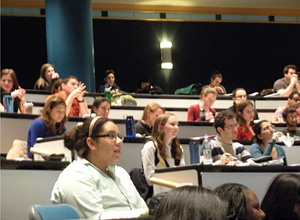Educational Programs

In 1850, this country's first medical school for women was founded in Philadelphia. Today, as Drexel University College of Medicine, the institution continues its historic commitment to women's health education by integrating women's health issues (including basic science, clinical and psychosocial aspects) into Foundations and Frontiers teaching cases. The process involves examination of all the cases to ensure equal representation of women and men, and avoidance of stereotypes.
Recognizing that diversity issues are important in diagnosing and treating people of all genders, we include opportunities for learning about racial, ethnic, economic and lifestyle differences. Cases have also been examined to include important content issues like domestic violence, menopause, eating disorders, premenstrual syndrome, osteoporosis, etc. Relevant gender differences in presentation of illness and approaches to treatment have been highlighted.
Programs for Medical Students – Year 1 & 2
Women's Health Seminar Series
The Women's Health Seminar Series is an annual series consisting of monthly seminars providing in-depth learning on a broad range of women's health and health equity topics. The topics are focused on the interests of first- and second-year medical students and are open to all medical students and other members of the College of Medicine community.
Scholar Program
Students have the opportunity to earn the formal designation of either Women’s Health and Sex and Gender Scholar or Health Equity Scholar by fulfilling four requirements that demonstrate advanced scholarship in sex and gender medicine or health equity issues, respectively:
- Women's Health Seminar Series elective
- Scholarly paper/research
- Vetted community experience
- Educational resource
The scholar program is a great opportunity for medical students to take a deep dive into a subject of particular interest to them. Working in Philadelphia to complete their requirements exposes students to a wide range of social issues within the city, allowing them to not only build their knowledge base, but to contribute to their local community as well. Learn more about our Scholar Program requirements. [PDF]
Meet our scholars!
Programs for Medical Students – Year 4
Women's Health Fourth-Year Electives
We offer women's health electives for fourth year students interested in more intense women's health training. For the purposes of these electives, we define “women’s health” as medicine that focuses on the treatment and diagnosis of diseases and conditions that affect a woman’s physical and emotional wellbeing. This includes, but is not limited to, gynecologic and reproductive care. Most electives require: a project (paper/poster/health ed material) on a selected topic; participation and attendance at the both the Sex and Gender Medicine Seminar; and journal club during the elective block. For specific requirements for each elective, please see the Senior Elective Catalog and/or contact our office.
Academic
This independent study elective is for students interested in developing skills in academic medicine in sex and gender medicine. Students will perform a literature review, critically analyze the literature, develop and refine a research question and generate a final product (paper or curriculum) exploring a topic related to women’s health or sex & gender.
Ambulatory
This elective is divided into acquiring advanced knowledge in both clinical and academic areas of sex and gender medicine (SGM). Students will enhance their knowledge, attitudes and skills in delivery of health care by working in three settings: comprehensive primary care, subspecialty care and community. A variety of clinical settings are offered depending on the student’s specialty of interest, setting availability and time of year.
College Health
This elective provides an opportunity to learn about primary care for college students in multi-disciplinary health settings through site visits to the student health clinic, counseling center, psychiatry/psychology services, crisis center, student life, public health and university police/public safety departments. Areas explored include substance abuse, body image, sexual health, gender Identity, common acute illnesses, common learning and mental health disorders, immunizations, travel medicine and campus violence/sexual assault.
Community
Students will identify and connect with a community organization to explore issues facing healthcare providers from the perspective of the community impact on health by working in a community-based setting. They will learn about the physician's role when interfacing with social service agencies, describe the patient experience from a community perspective, enhance skills in communication with respect to health education and advocacy, analyze and articulate the processes of accessing care from the community and patient perspective, articulate the implications of social and economic factors, and describe how to partner with community groups and agencies in order to order to form effective collaborations that benefit patients.
Public Policy
In this independent study elective, students will learn about public policy structure and function while working on discrete issues influencing patients. In researching a specific topic related to public policy in sex and gender medicine and generating a paper/project on that topic, students will describe the role of the physician in health policy and explain the process of making systemic change in health through the public policy system.
Resources for Medical Students
Please see other resources available for medical students on our resources page.
Back to Top